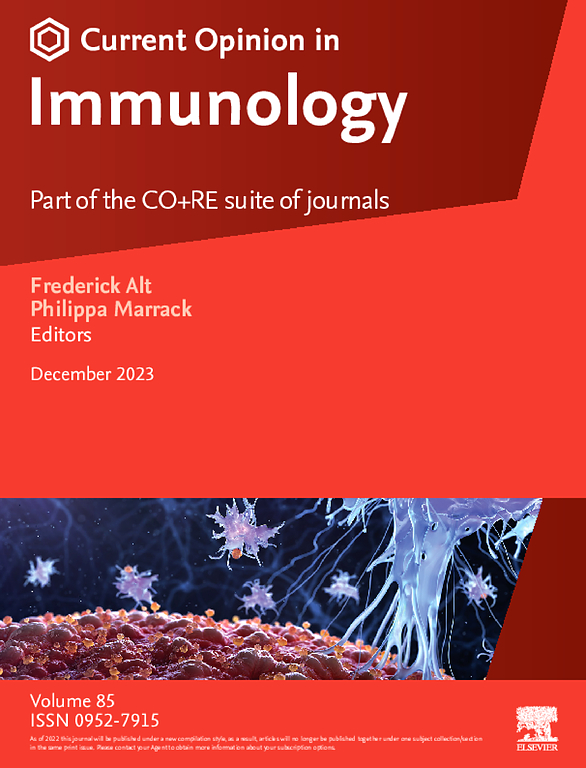C1抑制剂:从补体系统到缓激素血管性水肿
IF 5.8
2区 医学
Q1 IMMUNOLOGY
引用次数: 0
摘要
C1抑制剂(C1INH)是多种血浆途径的关键调节剂,包括补体、凝血、钾化钾-激肽系统和纤维蛋白溶解。C1INH缺乏导致下游血管活性肽缓缩素(BK)的过量产生,BK是血管性水肿(AE)的主要媒介,血管性水肿是一种罕见的疾病,其特征是身体各部位不可预测的肿胀发作。C1INH缺乏可能是遗传性的(由SERPING1基因突变引起)或获得性的(通常是潜在的淋巴细胞增生性疾病);C1INH水平和功能检测是C1INH缺乏症生物学诊断的金标准。其他形式的遗传性血管性水肿与正常的C1INH活性近年来出现。最新的指南对AE的分类、临床和实验室诊断以及伴有和不伴有C1INH缺乏的AE的管理提出了建议。目前的研究旨在发现bk介导的血管性水肿的新诊断和/或预后标志物,并强调C1INH缺乏与慢性合并症之间的联系。本文章由计算机程序翻译,如有差异,请以英文原文为准。
C1 inhibitor: from complement system to bradykinin angioedema
C1 Inhibitor (C1INH) is a crucial regulator of multiple plasmatic pathways, including complement, coagulation, kallikrein-kinin systems, and fibrinolysis. C1INH deficiency results in the downstream overproduction of the vasoactive peptide bradykinin (BK), the primary mediator of angioedema (AE), a rare disease characterized by unpredictable attacks of swelling in various locations of the body. C1INH deficiency can be hereditary (caused by a mutation in SERPING1 gene) or acquired (frequently underlying lymphoproliferative disease); C1INH level and functional assays are the golden standard for biological diagnosis of C1INH deficiency.
Other forms of hereditary angioedema with normal C1INH activity are emerged in recent years. The most recent guidelines have issue recommendations for classification, clinical and laboratory diagnosis, and management of AE with and without C1INH deficiency. Current axes of research aim to discover new diagnostic and/or prognostic markers of BK-mediated angioedema as well as emphasize the link between C1INH deficiency and chronic comorbidity.
求助全文
通过发布文献求助,成功后即可免费获取论文全文。
去求助
来源期刊
CiteScore
13.30
自引率
1.40%
发文量
94
审稿时长
67 days
期刊介绍:
Current Opinion in Immunology aims to stimulate scientifically grounded, interdisciplinary, multi-scale debate and exchange of ideas. It contains polished, concise and timely reviews and opinions, with particular emphasis on those articles published in the past two years. In addition to describing recent trends, the authors are encouraged to give their subjective opinion of the topics discussed.
In Current Opinion in Immunology we help the reader by providing in a systematic manner: 1. The views of experts on current advances in their field in a clear and readable form. 2. Evaluations of the most interesting papers, annotated by experts, from the great wealth of original publications.
Current Opinion in Immunology will serve as an invaluable source of information for researchers, lecturers, teachers, professionals, policy makers and students.
Current Opinion in Immunology builds on Elsevier''s reputation for excellence in scientific publishing and long-standing commitment to communicating reproducible biomedical research targeted at improving human health. It is a companion to the new Gold Open Access journal Current Research in Immunology and is part of the Current Opinion and Research(CO+RE) suite of journals. All CO+RE journals leverage the Current Opinion legacy-of editorial excellence, high-impact, and global reach-to ensure they are a widely read resource that is integral to scientists'' workflow.

 求助内容:
求助内容: 应助结果提醒方式:
应助结果提醒方式:


